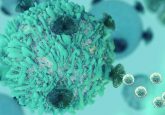Has the secret of the immortality cancer switch been unlocked?

Researchers from the University of California San Francisco (UCSF, CA, USA) have uncovered a mutation in the gene regulator termed the TERT promoter. This mutation reactivates telomerase, allowing for indefinite telomere maintenance and enabling tumor cell immortalization.
The mutation in the TERT promoter is the third most common mutation among all human cancers and the most common mutation in glioblastoma.
In this study the team demonstrated that patient-derived glioblastoma cells with TERT promoter mutations depend on a protein termed GABP for their survival, a protein which is critical to the workings of most cells.
Specifically the researchers discovered that the specific component of this protein that activates mutated TERT promoters, the subunit GABP-β1L, appears to be dispensable in normal cells.
By eliminating this subunit using CRISPR-based gene editing the team were able to dramatically slow the growth of the human cancer cells in lab dishes. Furthermore, orthotopic xenografting of β1L-reduced, TERT promoter mutant glioblastoma cells rendered lower tumor burden and longer overall survival in mice.
Conversely, removing GABP-β1L from healthy cells had no marked effect. The findings were recently published in Cancer Cell.
“These findings suggest that the β1L subunit is a promising new drug target for aggressive glioblastoma and potentially the many other cancers with TERT promoter mutations,” commented study senior author Joseph Costello (UCSF).
The next step for this research will be to identify small-molecule drugs that could have a similar effect as the gene editing used in the current experiments, explained Costello.
“In theory what we have now is a therapeutic target that is not TERT itself, but a key to the TERT switch that is not essential in normal cells,” Costello added. “Now we have to design a therapeutic molecule that would do the same thing.”
Telo Therapeutics (CA, USA) is currently conducting small molecule screens to find such a molecule, in partnership with GlaxoSmithKline (UK).
Sources: Mancini A, Xavier-Magalhães A, Woods W et al. Disruption of the β1L isoform of GABP reverses glioblastoma replicative immortality in a TERT promoter mutation-dependent manner Cancer Cell doi: https://doi.org/10.1016/j.ccell.2018.08.003 (2018)(Epub ahead of print); www.ucsf.edu/news/2018/09/411591/researchers-unlock-secret-deadly-brain-cancers-immortality




